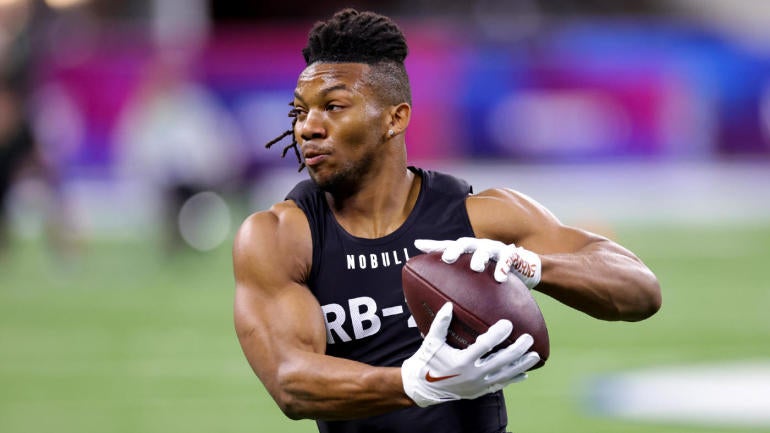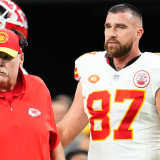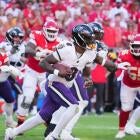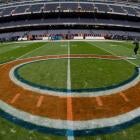NFL Draft: With Bijan Robinson set to go early in 2023, a look at how top RB picks of last 20 years have fared
A survey of top RB draft selections since 2003

Texas running back Bijan Robinson has drawn rave reviews in the lead-up to the 2023 NFL Draft. A projected three-down ball-carrier, his blend of size, speed and strength has experts comparing him to current Pro Bowlers like Josh Jacobs and Saquon Barkley, both of whom got big pay raises this offseason. Draft analyst Chris Trapasso, meanwhile, has Robinson cracking the top 20 in his latest first-round mock draft, predicting the Lions will select him 18th overall.
But in the light of the increasing perception that RBs are more replaceable than ever, how early can we actually expect Robinson to be selected come draft day? And what does history tell us about the career prospects of the top RB taken each year?
We decided to turn the clock back, reviewing the top RB pick from each of the last 20 drafts, for some insight. Included below are the total number of Pro Bowls earned by each RB with their original team, plus how many seasons each RB lasted with the club that drafted him. Pro Bowl selections are of course a very unscientific mark of NFL achievement, but they do help paint a picture of whether a team's first-round investment paid off.
| Year | Drafted | Player | Team | College | Years w/ Team | Pro Bowls |
|---|---|---|---|---|---|---|
2022 | 2 (36) | Iowa State | 1+ | 0 | ||
2021 | 1 (24) | Alabama | 2+ | 1 | ||
2020 | 1 (32) | LSU | 3+ | 0 | ||
2019 | 1 (24) | Josh Jacobs | Alabama | 4+ | 2 | |
2018 | 1 (2) | Saquon Barkley | Penn State | 5+ | 2 | |
2017 | 1 (4) | LSU | 3 | 0 | ||
2016 | 1 (4) | Ohio State | 7 | 3 | ||
2015 | 1 (10) | Georgia | 5 | 3 | ||
2014 | 2 (54) | Washington | 2 | 0 | ||
2013 | 2 (37) | North Carolina | 8 | 0 | ||
2012 | 1 (3) | Alabama | 2 | 0 | ||
2011 | 1 (28) | Alabama | 8 | 2 | ||
2010 | 1 (9) | Clemson | 5 | 1 | ||
2009 | 1 (12) | Georgia | 5 | 0 | ||
2008 | 1 (4) | Raiders | Arkansas | 7 | 0 | |
2007 | 1 (7) | Oklahoma | 10 | 7 | ||
2006 | 1 (2) | Saints | USC | 5 | 0 | |
2005 | 1 (2) | Auburn | 6 | 1 | ||
2004 | 1 (24) | Rams | Oregon State | 9 | 4 | |
2003 | 1 (23) | Willis McGahee | Bills | Miami | 4 | 0 |
Let's start with the average landing spot of the first RB pick: 17th overall. But wait, you say, I thought RBs didn't go in the first round anymore! Well, that's simply not true. It is true that RBs have been less common early in the first round; if you look strictly at the last five years, the first RB pick has averaged the 24th overall selection, and if you remove the Saquon Barkley year, that overall average drops even farther, to 29th overall. But prior to 2022, when Hall kicked off the RB run in the second round, there had been seven straight first-round RB picks. And it wasn't that long ago -- 2016-2018 -- when we had three straight years with top-five (!) RB selections. In fact, half of the top RB picks of the last 20 years have been top-10 overall selections.
In other words, it won't be unprecedented -- not even close -- if Bijan Robinson goes not only on Day 1 of the 2023 NFL Draft, but in the top half of the round. The real question lies in the evaluation of Robinson: how much do interested teams believe the Texas prospect is bound for a game-changing career? Is he closer to Adrian Peterson, or Saquon Barkley? Because while the latter may help set the standard for today's backs, there is a difference between the two. That's not to say Barkley can't keep growing as a centerpiece of the Giants, but the last 20 years of information regarding top RB picks suggests it's rare to secure a long-term superstar at the position. That can be applied to most picks in the draft, yes, but it's just as true here.
Now five of the last 20 top RB picks are active with their original teams, so it's not entirely fair to assess them. At first glance, however, they appropriately mirror the mixed bag that is the entire crop of selections. Barkley and Jacobs have taken turns battling injuries and offering All-Pro production as throwback workhorses; they've occasionally justified their pre-draft hype, but they've also yet to warrant lucrative long-term commitments from the Giants and Raiders, respectively. Edwards-Helaire has effectively already been replaced in Kansas City, seeing his role reduced in two straight seasons, while Hall and Harris are question marks. The former exploded as the Jets' RB1 early, only to have his promising rookie year cut short by an ACL tear, while Harris has been busy, if a bit sluggish, for the Steelers.
What else can we take away from the group as a whole? Once again: it's hard to get sustainable elite production, even taking the consensus top RB on the board. If we remove Hall and Harris from the equation, giving us 18 RB picks, we have a combined 25 Pro Bowl selections from those players. That sounds good -- an average of 1.4 Pro Bowl nods per player. But 11 of those 25 Pro Bowls, or 44%, came from just two players -- Adrian Peterson and Steven Jackson, old-school bell-cows drafted in the 2000s.
The average length of each RB's career with his original team -- 5.7 years -- also sounds decent on the surface. Why not sign up for almost six years of first-round talent at a position that seemingly tends to break down early, right?
Well, consider the wildly different career paths of all the RBs here who lasted at least five years with their original teams: C.J. Spiller (5 years), Reggie Bush (5) and Knowshon Moreno (5) combined for two 1,000-yard rushing seasons and a single Pro Bowl nod; Todd Gurley (5) had an abrupt decline in Year 5 before knee injuries effectively ended his career; Ronnie Brown (6) and Darren McFadden (7) were frequently unavailable; Ezekiel Elliott (7) peaked early and commanded top dollar from Dallas; Giovani Bernard (8) was always a rotational back for the Bengals; Mark Ingram (8) thrived later in his career, particularly after splitting carries; and Jackson (9) and Peterson (10) are the future Hall of Fame outliers.
All that to say, Bijan Robinson may well be the next RB to join the first-round club. And he may have the traits to outlast a traditional rookie contract, even in today's NFL. Only time will tell whether he joins the outliers among top-RB standouts.


















